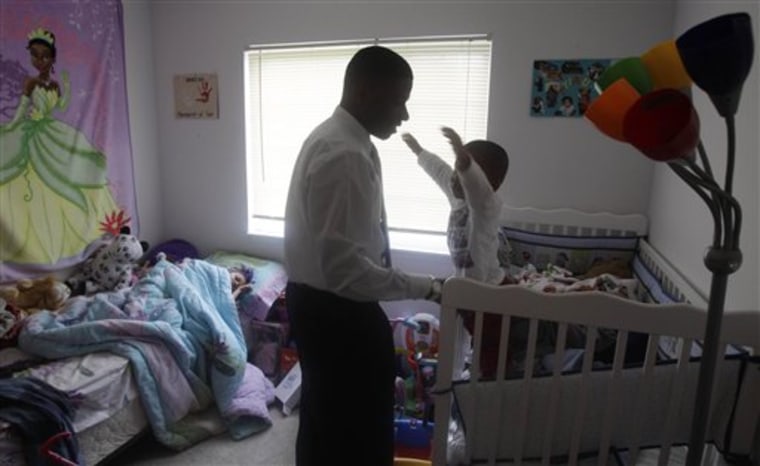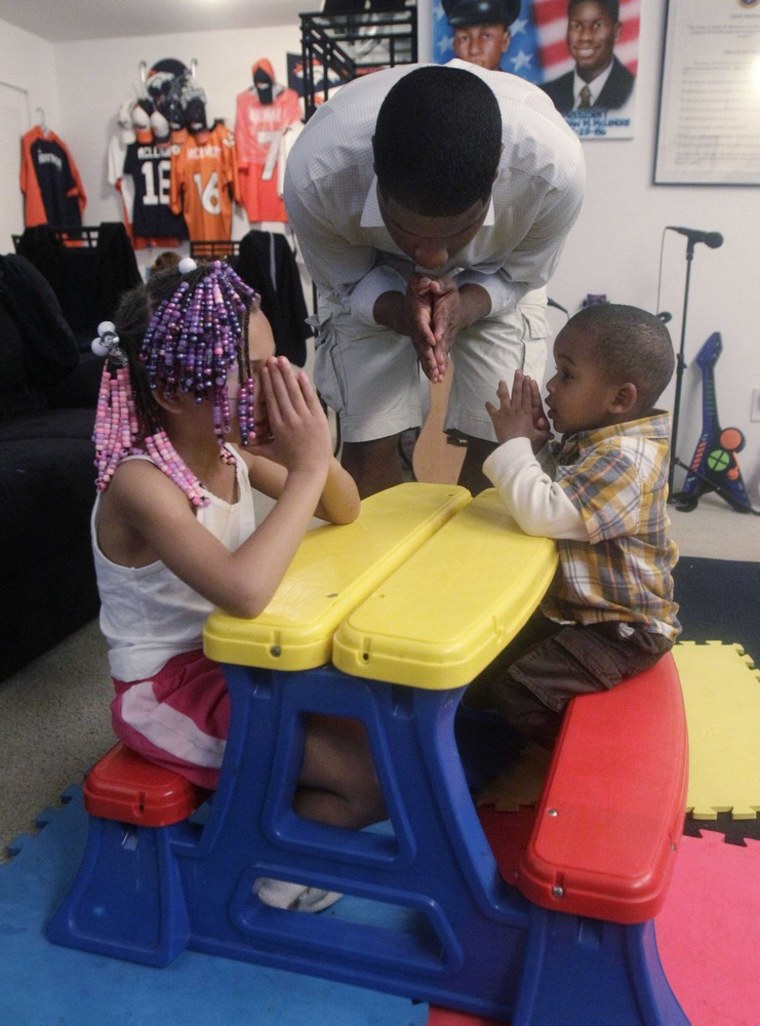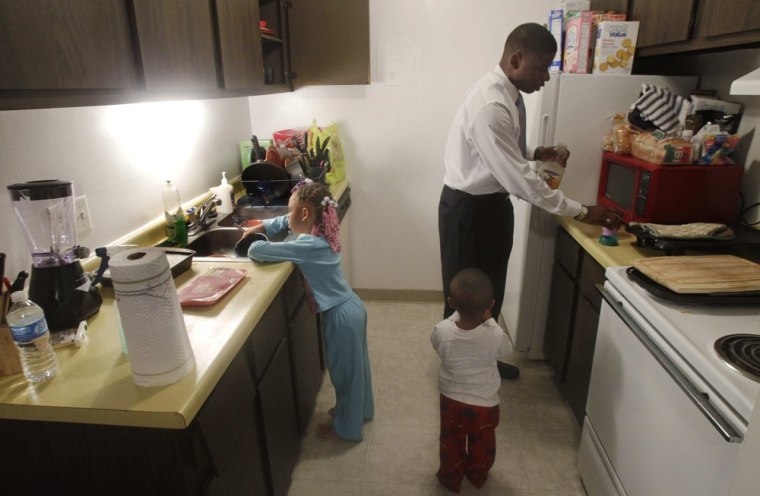Growing up, Adrian McLemore was a troubled little soul who spent much of his time exploding in confusion and rage.
At 6, he nearly set the house on fire.
At 7, his mother — raising him and his two sisters alone in Georgia — told social workers to place him in a foster home.
McLemore would spend a total of 11 years in foster care and he would learn many things — how to control his anger, how to channel it into programs that helped children like himself, how to survive in homes where families had completely different rules and expectations.
He learned that foster kids are largely invisible to the lawmakers who craft the rules that govern their lives. And he became determined to change that, joining youth organizations, becoming a dynamic young leader who lobbied fiercely for the rights of foster children to a better childhood — and a better preparation for adulthood.
And then, at 22, McLemore — who had devoted so much time to thinking, speaking and writing about the lessons of his own childhood — would be given a chance to put those lessons into practice.
Overnight, he became a "father."
___
The call came shortly after midnight on Dec. 20, 2009. There had been a bad situation at his sister's house, the sheriff told him on the phone (McLemore won't discuss the details). Her children — 3-year-old A'Rayiah and 1-year-old Tyiaun — had been taken into custody.
Driving to the police station, McLemore knew exactly how things would unfold. The children would be separated and placed in different foster homes. There would be tense weekly visits with their mother in a small room at the Montgomery County Department of Job and Family Services. His sister would vent at the case workers. A'Rayiah would cry.
It would be like watching his own wounded childhood, repeating itself.
McLemore was a full-time student at Wright State University studying political science. His days were packed with classes and studies, as well as a grueling schedule of speeches, presentations, committee meetings. And he had a job at a video store.
But he didn't hesitate.
"I will take care of my niece and nephew," he told the authorities. "I will feed them and take them to day care. I will give them a stable home. I know them. And I love them like no one else can."

And so he bundled up the children and drove them to his two-bedroom apartment on Culzean Drive.
McLemore is well known as one of the success stories of the Ohio Foster care community. Some of the people closest to him are social workers who have seen him blossom over the years.
Word spread quickly. Friends threw a baby shower — collecting clothes and toys.
They helped with baby-sitting. They coached him on diaper-changing and offered advice on nighttime crying.
But for all the outpouring of support and goodwill, there were some who felt he had made a huge mistake. You don't know what you are getting into, they warned. Your studies will suffer. How are you going to provide for two small children who need everything?
McLemore had just one response.
"I refuse to allow another generation of McLemores to be raised in foster care."
___
One of McLemore's prized possessions is a large painting in his living room. It depicts McLemore shoulder to shoulder with a thin, serious looking man in military uniform.
McLemore worships the memory of his father, who died of cancer in 2004. The two years he lived with his Dad, he says, were the happiest of his life.
He was 9 at the time, and his beloved grandmother Essie — his father's mother — had decided to take him out of foster care and raise him herself. And then, the unimaginable happened. She was killed in a car accident on her way to pick him up.
McLemore was so bereft he tried to drown himself in the bathtub.
His father, Air Force Staff Sgt. Ernest McLemore, had long been divorced from McLemore's mother and had been stationed overseas. He returned for the funeral and told McLemore and his two sisters that he was taking them to Las Vegas to begin a new life.
McLemore's face glows as he talks of those years, of being with his sisters, of having his own room, of having a father who took them to soccer and karate and theme parks.

But that blissful time ended as abruptly as it had begun. His father was being shipped overseas. The children were going back to their mother, who had moved to Ohio.
There, McLemore said, things spiraled out of control. Their mother drank. She went missing. There was often no food or clean clothes. He would run away.
Social worker Carla Merritt remembers an intense, unruly young teen seething with anger and bitterness. But she also saw a determination and focus rare for such a child.
"Adrian," she told him, "you have such great potential. You could do anything, be anything. But you have to learn to close your mouth and listen."
But nothing could contain McLemore's anger the day he went to middle school in clothes that smelled like fish.
He stormed home, took out his Sunday suit and wore it to school the next morning. From that day, Adrian McLemore would always be the best dressed person in the room.
___
"The biggest thing children need, in addition to unconditional love, is a comfortable, safe environment, a sense of stability and permanence," McLemore says, with all the clarity of someone who did not have these things. "Children need to know their siblings and spend time with them, not just in weekly visits with a case worker, but at picnics and in parks and with family members like aunts and uncles and grandparents."
McLemore is sitting in his living room, but he speaks with the same conviction and intensity he has brought to speeches before countless state and congressional committees and study groups. Determined to run for political office someday, he addresses lawmakers as "my future colleagues" as he urges them to increase, not reduce, funding for foster care programs.
Impeccably dressed, with a deep voice and imposing presence, McLemore makes a striking impression. And he gets things done.
He successfully advocated to have Medicaid coverage extended to age 21 for former foster children. He was a founding member and first president of the Ohio Youth Advisory Board, which has become a powerful advocacy group for foster youth. He worked with the administration at Wright to allow former foster students live in dorms during school breaks, so they wouldn't end up homeless.
McLemore isn't sure what prompted him to get so involved. Perhaps he wanted to escape the loneliness of an uncertain home life by becoming part of a larger community, creating a "family" of his own.
For although McLemore has nothing but respect and admiration for the families who cared for him, their homes never felt like the loving, permanent home he has created for A'Rayiah and Tyiaun.
"You simply never know when you might be told to pack your things and leave," he says. "In foster care, families can always say, 'Take him back.' Real parents don't have that option."
___
He calls them "my precious cargo"
A'Rayiah, 4, has eyes that turn from pale green to gray, and a mop of pink-beaded braids. Sweet and soft-spoken, she dreams of playing basketball, of living with her mom, of having her uncle buy a van big enough to hold their entire extended family of cousins and aunts and grandparents.
Her 2-year-old brother, Tyiaun, is a cherubic-faced tornado of energy, tottering and tumbling, smiling when he is not pouting, asking never ending questions in a language all his own.
McLemore posts notes about them on Facebook, proudly describing the daily joys and tribulations of parenting.
"I just submitted the last form for A'Rayiah's 'big girl' school. This is a proud moment for this young African American 'father'!"
"My boy and I are headed to the barber shop. I savor these moments of fatherhood; I mean unclehood!"
As a parent (though he prefers the term "protector"), McLemore describes himself as a "gentle dictator." There are strict rules at home: no juice in the living room, toys must be put back in their place, time-outs for whining.
But he also loves having fun when the chores are done — pillow fights, letting the kids jump on his bed, and, their favorite, throwing a rollicking rock concert in the living room. They grab their toy guitars and mics, put on a concert tape of Elton John or Bon Jovi on the big-screen television and belt out the songs with all their might.
McLemore is filled with awe watching them develop, conscious of how much his influence is shaping them.
"Uncle, I love you," A'Rayiah calls out as she sits in her pajamas, munching frosted flakes and watching "The Lion King."
"I love you too, sweetie," McLemore replies. "Now finish up and get dressed."
She trots to her room. He starts changing Tyiaun's diaper, a job he hates.
"I can't WAIT for this stage to be over," he says, so vehemently it startles Tyiaun, who gives him a puzzled look.
They pile into the car, turn Michael Jackson's "Beat It" up full blast, and happily sing along all the way to the day care center.
McLemore kisses them goodbye and heads off to a full day of classes at Wright, a few hours of after-school tutoring at a local high school, and then back to the day care center to pick them up at 6.
___
Parenthood has changed everything about McLemore's life, except his long-term goals. Gone are the days of living on chili cheese fries and root beer. Now his shopping list includes Lunchables, fruit cups and diapers.
His social life is practically nonexistent, except during football season when he spends every possible moment watching the Denver Broncos. Weekends, when the children visit their mother, are devoted to sleeping, cleaning and catching up on studies.
McLemore believes fatherhood has humbled him, made him feel less self-important.
"I come home at the end of the day, and it's all about them," he says.
And yet, there are times it seems overwhelming.
He talks to his father all the time, writes anguished letters about how much he misses him, how he wishes he was there to guide him.
"Daddy, I get up every day and put on so many hats that sometimes I forget which one I'm wearing," McLemore wrote in one letter. "I am a father, student, a worker, a friend, a protector, a leader, a brother and whatever anyone asks me to be. But most of all, when I step out of the hallway where our painting hangs, I am a grieving son."
In the absence of his father, McLemore says, he believes that foster care turned him into the leader he is today, nurturing his ambition and drive. Social workers boast he is their star: There is a McLemore "wall of fame" in the Montgomery County Youth and Family Services center, with pictures of him and the children.
But McLemore knows that most children raised in foster care don't make it onto a wall of fame. Many don't make it to college. And the loneliness and instability he felt growing up makes him determined that A'Rayiah and Tyiaun will not experience the same.
The children will likely go back to their mother later this summer, though McLemore expects to see them every weekend. He doesn't know how he will feel when they go — relieved and happy to resume a social life, or sad.
He believes they should be with their mother. But, he says, they will always have a place with him.
"I will always be their uncle, their protector," he says. "And whenever they need me to be, I will step into the role of father."
